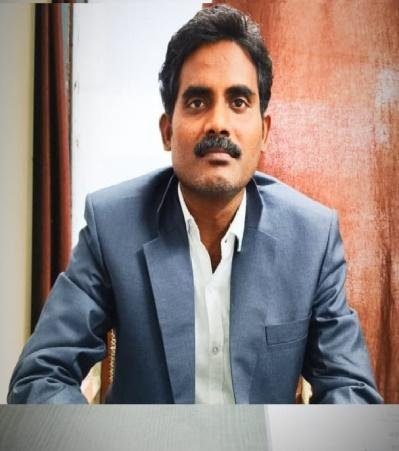Electrical & Electronics Engineering
- Electrical & Electronics Engineering
Electrical & Electronics Engineering

Dr. K. RAJU
M. Tech(JNTUHCEH) , Ph. D (JNTUH)
Professor & Head of the Department
Email Id :- eee@tkrcet.com
Dr. K. RAJU received B. Tech. in Electrical Engineering from JNTU University, Hyderabad, in 2007, M. Tech. in Electrical power Engineering from JNTU University, College of Engineering Hyderabad, in 2011 and Ph.D. in Electrical Engineering from Jawaharlal Nehru Technological University, Hyderabad, India in 2018. He has 25 research publications in International/ National journals / conferences to his credit.
He has guided 12 M. Tech students and 2 students are under progress. He is life member of Institution Engineers (India) & Life Member of ISTE. He has received best research paper award in International Conferences by TKREC. Currently he is Professor of Electrical & Electronics Engineering. His research interest includes Soft computing applications to evaluation of Power system Reliability, Smart Grid Technology, FACTS, Intelligent Power System Planning and Optimization. He received Ph. D Guideship from JNTUH R&D, Hyderabad.
About the Department:
The Department of Electrical Engineering, established in 2002, initially offered a B. Tech program in Electrical & Electronics Engineering. To diversify and provide industry-oriented training at the postgraduate level, the department introduced M. Tech courses in Power Electronics in 2010. Currently, research efforts are focused on various areas within Electrical Engineering, such as Power Systems, Power Electronics and Drives, Power Converters, High Voltage Engineering, Control Systems, Artificial Intelligence Techniques, Renewable Energy Resources, Electric Vehicles, and software tools like ETAP, MATLAB, Ansys, and Python.
The department has a dedicated team of twenty regular faculty members who are highly experienced and actively engaged in research. It is also well-equipped with state-of-the-art facilities and supported by qualified technical staff. Additionally, the department’s undergraduate programme is accredited by the NBA, tier-II up to 2022.
- Vision
- MISSION
- P.O's
- PEO's
- PSO's
- To produce quality graduates with technical knowledge in the domain of electrical and electronics engineering, leading to meet the needs of industry and society by sustaining ethical and moral values.
M1:To impart quality education through effective teaching and learning processes.
M2:To provide an ecosystem to enhance students technical competence and prepare them for evolving technological challenges.
M3:To nurture a dynamic learning environment that inspires both faculty and students to develop self-reliance.
PO1: Engineering knowledge: Apply the knowledge of mathematics, science,engineering fundamentals, and an engineering specialization to the solution of complex engineering problems.
PO2: Problem analysis: Identify, formulate, review research literature, and analyze complex engineering problems reaching substantiated conclusions using first principles of mathematics, natural sciences, and engineering sciences.
PO3: Design/development of solutions: Design solutions for complex engineering problems and design system components or processes that meet the specified needs with appropriate consideration for the public health and safety, and the cultural, societal, and environmental considerations.
PO4: Conduct investigations of complex problems: Use research-based knowledge and research methods including design of experiments, analysis and interpretation of data, and synthesis of the information to provide valid conclusions.
PO5: Modern tool usage: Create, select, and apply appropriate techniques, resources, and modern engineering and IT tools including prediction and modeling to complex engineering activities with an understanding of the limitations.
PO6: The engineer and society: Apply reasoning informed by the contextual knowledge to assess societal, health, safety, legal and cultural issues and the consequent responsibilities relevant to the professional engineering practice.
PO7: Environment and sustainability: Understand the impact of the professional engineering solutions in societal and environmental contexts, and demonstrate the knowledge of, and need for sustainable development.
PO8: Ethics: Apply ethical principles and commit to professional ethics and responsibilities and norms of the engineering practice.
PO9: Individual and team work: Function effectively as an individual, and as a member or leader in diverse teams, and in multidisciplinary settings.
PO10: Communication: Communicate effectively on complex engineering activities with the engineering community and with society at large, such as, being able to comprehend and write effective reports and design documentation, make effective presentations, and give and receive clear instructions.
PO11: Project management and finance: Demonstrate knowledge and understanding of the engineering and management principles and apply these to one’s own work, as a member and leader in a team, to manage projects and in multidisciplinary environments.
PO12: Life-long learning: Recognize the need for, and have the preparation and ability to engage in independent and life-long learning in the broadest context of technological change
PEO 1:Graduates will be technically competent and will have the required interdisciplinary skills and experience with the latest tools of electrical and electronics engineering to enter careers where they will apply their knowledge to identify, analyze and come up with solutions to technical problems.
PEO 2:Graduates will have the ability to analyse problems related to current trends in Electrical and Electronics Engineering, effectively addressing the evolving needs of society.
PEO 3:Graduates will have proficiency in handling tasks both public and private sectors of Electrical and Electronics Engineering.
PEO 4:Graduates will engage in lifelong learning for a successful professional career includes strong moral and ethical values.
PSO1: Comprehending and conceptualizing principles of operation, design, performance and testing of static and dynamic rotating machines and power electronics based electric drives.
PSO2: Procuring knowledge in analysis, operation, control, protection, and simulation of electrical power systems for generation (hydro, thermal, nuclear and new renewable sources of energy), transmission, distribution and utilization
- Campus Resources
- Student Degree Verification
- New Student Registration
- Income Declaration Form (2024-25)
- NCC
- NSS
- SOP
- Achievements
- Good Governance Document
- Strategic Plan & Program Development Document
- Research Policy Document
- Ombudsperson
- Route Map
- Virtual Tour 360
- Service Rules
- Online Grievance Cell
- B Category / Management Application Form
- Feedback(s)
- Mandatory Disclosures
- Code-of-Conduct
- Home
 Student Degree Verification
Student Degree Verification



